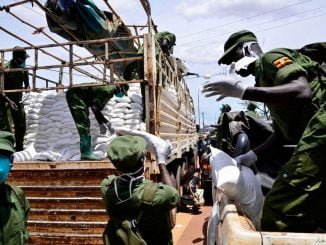
Kampala, Uganda | URN | President Museveni has acknowledged the progress achieved in the fight against Ebola but extended the lockdown in Mubende and Kassanda districts for another 21 days.
The lockdown restricts movements in and out, as a measure to prevent the spread of the Ebola disease. Mr. Museveni said that the government has been able to stop further spread in the districts of Masaka, Kyegegwa, Bunyangabu and Kagadi and that the health Ministry swiftly handled Jinja where more than 300 contact persons were listed and put under institutional quarantine.
According to the President, it is now 14 days since the last case in Jinja district and no other have been registered from those areas but those in quarantine must complete the 21 days lockdown for the health workers to be sure that they are free of Ebola.
Statistics from the health ministry show that a total of 6 confirmed cases are still admitted and receiving treatment where 5 at Mubende and 1 patient is undergoing treatment from Entebbe Ebola Treatment Units.
However, Mr. Museveni said that it is too early to celebrate any successes although the picture is good. He directed that all the restrictions shall be extended for another 21 days citing the need to further sustain the gains in control of Ebola that have been made, and to protect the rest of the country from exposure.

The measures include a curfew in Mubende and Kassanda districts starting from 7:00pm to 6:00am, plus public transport, private transport and Boda-bodas not being permitted to move. Other restrictions are; the suspension of seasonal markets, closure of worship places, social places like bars and gyms while all burials must be conducted by the safe burial teams.
Mr. Museveni announced the measures in a statement read for him by Vice President Jessica Alupo on Ebola Virus Disease Outbreak.
He reasoned that the country has been responding to the Ebola outbreak for nearly 2 months and one week and has registered success with 3 districts of Kagadi, Bunyangabu, and Kyegeggwa retired from the follow up list having completed more than 42 days since the last case of Ebola was reported, coupled with no further spread while Mubende, Kassanda, Kampala, Wakiso, Jinja and Masaka which are still under follow up.
President Museveni also said that there are districts with imported cases, with secondary transmissions such as Wakiso, Masaka, Jinja and Kampala and that they continue to register progress in control of the outbreak as observed by the number of days since the last confirmed case was registered.

He observed that Mubende and Kassanda districts have also made good progress and a very commendable job in controlling the disease and the spread except for the one case registered in Mubende on November 13 after the district had gone 15 days without reporting a case.
The President said that it is currently 13 days since this latest case was reported in Mubende hence more work still needs to be done for the district to be completely free of Ebola.
In Kassanda, Museveni said there is an improved progress in the response and that it is 15 days since the district reported a confirmed case of Ebola. He said that they are aware of the challenges of a weak health system, myths, misinformation, and belief in witchcraft coupled with a single incident of exhumation of a dead body that resulted into a flare up of cases.
Read Also: WHO upgrades Uganda’s Ebola risk situation to ‘very high’
On October 15, President Museveni ordered a number of movement restrictions into and out of Kassanda and Mubende districts which were aimed at blocking the spread of Ebola virus disease to densely populated areas in Kampala and Wakiso. The first 21 days elapsed on November 4 and the restrictions were on November 5 extended until November 26.
While commending the people of Mubende and Kassanda for abiding by the measures, Museveni explained that the lockdown measures have worked and that the government has been able to avert the importation of the virus into Kampala.
He also acknowledged the pain and the inconvenience caused by the restrictions but insisted that had they allowed the escalation of the outbreak into Kampala, the consequences would have been bad, including possible exportation to other countries.


